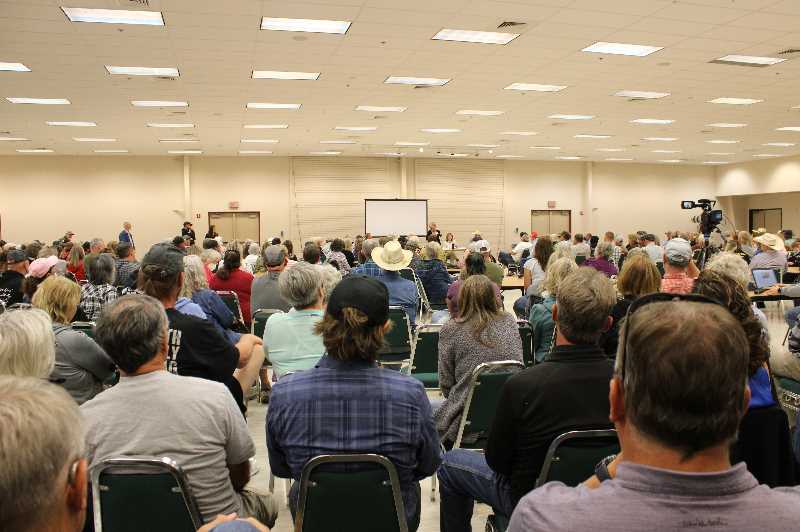This article was published on: 09/14/21 1:08 PM
Turnout for a recent meeting crowded the Sisters Building in Deschutes County with close to 600 people.
Hard-working pickups jammed the parking lot at the Deschutes County Fairgrounds for a recent meeting last month. By 7 p.m., the Sisters Building filled wall to wall with farmers, and ranchers, and the people who support them, with another ring of people standing around the sides of the room.
“I felt very supported,” says JoHanna Symons of Symons Beef Company, who organized the event. “People really want something to change.”
People at the meeting want to change the Habitat Conservation Plan which outlines how water in the Deschutes Basin gets shared between irrigators and threatened or endangered species.
Farmers in Central Oregon saw precious water reserved for habitat this year while the drought cut their production to one third of normal. The water shortage forced ranchers to sell their cattle earlier and lighter than normal.
Drawing on the funds of her nonprofit, Perfect Balance, Symons called in some heavy hitters to advise area farmers how to effectively advocate for their water rights.
Attorney Gary Baise specializes in agriculture-environmental litigation, and, according to the Capital Press, helped pick President Trump’s agricultural advisory team. Baise was in Washington, D.C., when the Endangered Species Act was written.
Dave Duquette founded Western Justice and calls himself a political activist for agriculture.
Baise and Duquette drew the battle lines. “They,” the environmentalists versus “us” the irrigators.
“These people are not our friends no matter how smooth they talk,” said Duquette. “No matter how many lawyers or how much bullying they try to do, they’re not our friends.”
Karen Budd-Falen worked on revising the regulations of the ESA under the Trump administration. Aubrey Bettencourt worked on water and science issues for the Department of Interior.
While Baise and Duquette fired passions and inspired applause, Budd-Falen and Bettencourt served up more moderate, sage advice.
“Fight smart,” said Bettencourt. “It feels good to punch someone in the nose, but it doesn’t get your water back.”
Budd-Falen said in the same situation, she would have negotiated the HCP just as Central Oregon irrigators did. She described the penalties for getting out of the HCP, which include heavy fines and prison time.
“(The HCP) does have adaptive management,” said Budd Falen, “ways to change the HCP which are not as onerous as jumping out of the document altogether.”
Budd-Falen and Bettencourt both stressed getting armed with information, getting independent scientific reviews.
Symons asked how many had read the HCP. Of the 600-plus attendees, three or four raised their hands.
The people who showed up at this meeting certainly showed a will to fight. Their advisors told them they have stick together and do their homework to win their water back.
“You want to solve and answer these questions yourselves,” said Bettencourt, “before someone tells you how to do it.”
By Pat Kruis




